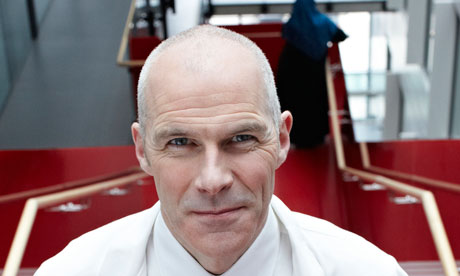
Mark Kearney has a simple view of his job as a cardiologist. He hates it. "I hate the misery heart disease brings. It does not discriminate. It takes the young and the fit."
The words of Kearney, a professor of cardiology at Leeds University, feature in a new series of TV advertisements, made by the British Heart Foundation. They were launched last night as part of a campaign to raise awareness of heart disease and its consequences.
According to the BHF, someone has a heart attack in Britain every seven minutes, while about 200,000 die of heart disease every year. "People are taking less exercise and eating more fast food," says Kearney. "There is more obesity as a result, and that in turn means more cases of diabetes, a condition closely linked to heart disease. Hence the simple fact that heart disease remains Britain's number one killer." The advert is intended to shock, and raise awareness. People need to understand how to reduce their risks of cardiovascular disease.
At the same time, more treatments are needed, and Kearney's work is focused on establishing these by trying to armourplate blood vessels so they do not trigger heart attacks in people who are predisposed to cardiovascular illness: "A heart attack leaves you with a damaged heart and a high risk of suffering heart failure. And heart failure is a scourge today. It causes early mortality, while those who survive are often left severely disabled."
One solution is to try to improve public health and fitness, Kearney said. "But even if everyone was slim and fit, we would still have lots of cases of heart failure. So we also need to think of new types of medical intervention."
A key approach for Kearney and his team has been to focus on diabetes, which is known to trigger damage to the endothelial cells inside arteries. "They line arteries, but get stripped away when people get diabetes for reasons that remain unclear.
"When this happens, the body assumes the artery has suffered a wound and this stimulates the manufacture of blood clotting factors. A clot forms and that can block the artery and lead to damage of heart muscle and a heart attack."
Kearney is trying to find ways to stop endothelial cells from being stripped from artery walls. "The body has cells that protect the endothelial lining of arteries. However, in diabetics it has been found that these key defences – endothelial progenitor cells – do not work very well. We need to find ways to improve their function."
Kearney and his team have extracted endothelial progenitor cells from patients, which are then genetically manipulated to boost their performance and increase their expression of different key proteins. Tests on mice found that the function of these progenitor cells was improved. Trials have yet to be carried out on humans, but if these are successful Kearney and his team believe they will be well on the way to developing a technique that could stop the processes that lead to blot clots forming and heart attacks occurring.
"Once a person gets diabetes, their cardiovascular system usually begins to deteriorate within a few years," said Kearney. "We are trying to halt this process and so prevent heart attacks." His approach is one of several by scientists trying to deal with the problem.
Others are working on ways to regenerate blood vessels after they been damaged, for example by a heart attack. "We need all sorts of approaches. Every day I see the consequences of heart attacks. People, in their sixties, whose hearts are so weakened they cannot walk from one lamp post to the next. And as the population gets older, and diabetes becomes more and more common, more and more people will end up in this condition."
His point is supported by Bronnach Pemberton, who appears in the BHF adverts scheduled to run on TV for the next few weeks. She had a severe heart attack after giving birth to her third child last year, and had to undergo emergency by-pass surgery. She has been left with a severely weakened heart. "I cannot lift my baby or go for walks," she says.
"A friend of mine is getting married but it is simply too tiring and too difficult for me to go. I might have survived my heart attack, but I am going through a life sentence."

